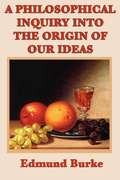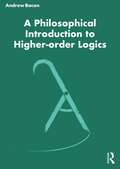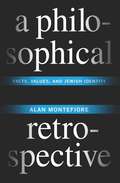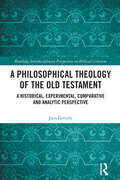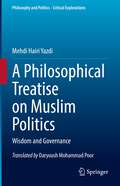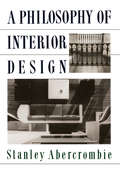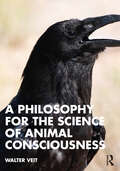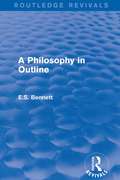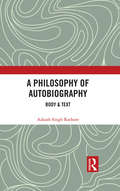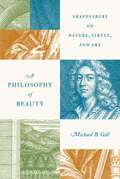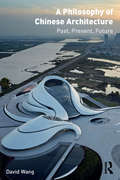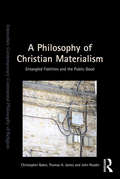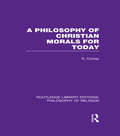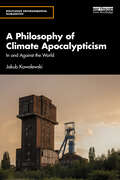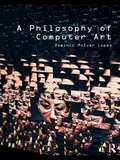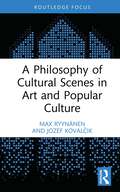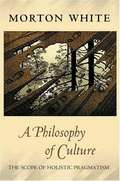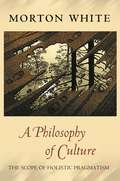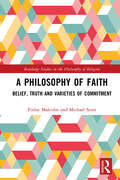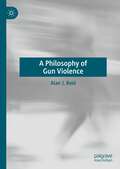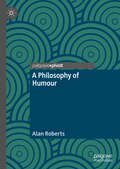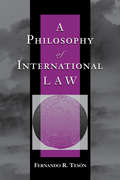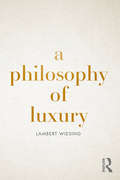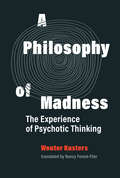- Table View
- List View
A Philosophical Inquiry into the Origin of Our Ideas
by Edmund BurkeAn eloquent and sometimes even erotic book, the Philosophical Enquiry was long dismissed as a piece of mere juvenilia. However, Burke's analysis of the relationship between emotion, beauty, and art form is now recognized as not only an important and influential work of aesthetic theory, but also one of the first major works in European literature on the Sublime, a subject that has fascinated thinkers from Kant and Coleridge to the philosophers and critics of today.
A Philosophical Introduction to Higher-order Logics
by Andrew BaconThis is the first comprehensive textbook on higher-order logic that is written specifically to introduce the subject matter to graduate students in philosophy. The book covers both the formal aspects of higher-order languages—their model theory and proof theory, the theory of λ-abstraction and its generalizations—and their philosophical applications, especially to the topics of modality and propositional granularity. The book has a strong focus on non-extensional higher-order logics, making it more appropriate for foundational metaphysics than other introductions to the subject from computer science, mathematics, and linguistics. A Philosophical Introduction to Higher-order Logics assumes only that readers have a basic knowledge of first-order logic. With an emphasis on exercises, it can be used as a textbook though is also ideal for self-study. Author Andrew Bacon organizes the book's 18 chapters around four main parts:I. Typed LanguageII. Higher-Order LanguagesIII. General Higher-Order LanguagesIV. Higher-Order Model Theory In addition, two appendices cover the Curry-Howard isomorphism and its applications for modeling propositional structure. Each chapter includes exercises that move from easier to more difficult, strategically placed throughout the chapter, and concludes with an annotated suggested reading list providing graduate students with most valuable additional resources. Key Features: Is the first comprehensive introduction to higher-order logic as a grounding for addressing problems in metaphysics Introduces the basic formal tools that are needed to theorize in, and model, higher-order languages Offers an abundance of- Simple exercises throughout the book, serving as comprehension checks on basic concepts and definitions- More difficult exercises designed to facilitate long-term learning Contains annotated sections on further reading, pointing the reader to related literature, learning resources, and historical context
A Philosophical Retrospective: Facts, Values, and Jewish Identity (Columbia Themes in Philosophy)
by Alan MontefioreAs a young lecturer in philosophy and the eldest son of a prominent Jewish family, Alan Montefiore faced two very different understandings of his identity: the more traditional view that an identity such as his carried with it, as a matter of given fact, certain duties and obligations, and an opposing view, emphasized by his studies in philosophy, according to which there can be no rationally compelling move from statements of fact-whatever the alleged facts may be-to "judgments of value." According to this second view, individuals must in the end take responsibility for determining their own values and obligations.In this book, Montefiore looks back on his attempts to understand the nature of this conflict and the misunderstandings it may engender. In the process, he illustrates through personal experience the practical implications of a characteristically philosophical issue. Montefiore finally settles on the following: while everyone has to accept that facts, including those of their own situation, are whatever they may be, both the "traditional" assumption that individuals must recognize certain values and obligations as rooted in those very facts, and the contrary view that individuals are ultimately responsible for determining their own values, are deeply embedded in differing conceptions of society and its relation to its members. Montefiore then examines the misunderstandings between those for whom identity constitutes in effect a conceptual bridge connecting the facts of who and what a person may be to the value commitments incumbent upon them, and those for whom the very idea of such a bridge can be nothing but a confusion. Using key examples from the notoriously vexed case of Jewish identity and from his own encounters with its conflicting meanings and implications, Montefiore depicts the practical significance of the differences between these worldviews, particularly for those who hove to negotiate them.
A Philosophical Theology of the Old Testament: A historical, experimental, comparative and analytic perspective (Routledge Interdisciplinary Perspectives on Biblical Criticism)
by Jaco GerickeAre we able to identify and compare the philosophical perspectives and questions that must be postulated as having been somehow present in the language, ideas and worldviews of the Biblical authors? This book sets out an approach to something that has been generally considered impossible: a philosophical theology of the Old Testament. It demonstrates and addresses the neglect of a descriptive and comparative philosophical clarification of concepts in Old Testament theology, and in so doing treads new ground in Biblical studies and philosophical theology. Recognizing the obvious problems with, and objections to, any form of interdisciplinary research combining philosophical and Biblical theology, this study presents itself as introductory and experimental in nature. The methodology opted for is limited to a philosophical clarification of concepts already found in Old Testament theology, while the findings are presented via the popular thematic approach found in analytic philosophical theologies; with no attempted justification or critique of the textual contents under investigation. These approaches are combined by primarily looking at the nature of Yahweh in the Old Testament. This book offers a new vision of Biblical and philosophical theology that brings them closer together in order that we might understand both more broadly and deeply. As such, it will be vital reading for scholars of Theology, Biblical Studies and Philosophy.
A Philosophical Treatise on Muslim Politics: Wisdom and Governance (Philosophy and Politics - Critical Explorations #21)
by Mehdi Hairi YazdiThis is a translation of Mehdi Hairi Yazdi’s حکمت و حکومت (Ḥikmat wa Ḥukūmat) which provides a philosophical critique of the theory of the guardianship of the jurist. This theory is currently the governance theory in Iran and Mehdi Hairi Yazdi’s treatise provides a critique based on both philosophical and traditional arguments. It asks numerous questions, such as: ‘Is the governance of jurists philosophically coherent, rational and efficient?’ and ‘How can Muslim communities have their own forms of governance in such a manner that their faith commitments are met while living in their own time without clashing with universal values of governance?’ and debunks the key foundation of the guardianship of the jurist. The present translation makes accessible, for the first time, the text of this critique in English, and provides a competing narrative based on his theory of joint public ownership in political theory.
A Philosophy Of Interior Design (Icon Editions)
by Stanley AbercrombieThis book explores and explains the fundamentals of interior design. Because it does not emphasize current trends and fashion, its value will be long lasting.
A Philosophy for the Science of Animal Consciousness
by Walter VeitThis book attempts to advance Donald Griffin's vision of the "final, crowning chapter of the Darwinian revolution" by developing a philosophy for the science of animal consciousness. It advocates a Darwinian bottom-up approach that treats consciousness as a complex, evolved, and multidimensional phenomenon in nature rather than a mysterious all-or-nothing property immune to the tools of science and restricted to a single species. The so-called emergence of a science of consciousness in the 1990s has at best been a science of human consciousness. This book aims to advance a true Darwinian science of consciousness in which its evolutionary origin, function, and phylogenetic diversity are moved from the field’s periphery to its very centre, thus enabling us to integrate consciousness into an evolutionary view of life. Accordingly, this book has two objectives: (i) to argue for the need and possibility of an evolutionary bottom-up approach that addresses the problem of consciousness in terms of the evolutionary origins of a new ecological lifestyle that made consciousness worth having and (ii) to articulate a thesis and beginnings of a theory of the place of consciousness as a complex evolved phenomenon in nature that can help us to answer the question of what it is like to be a bat, an octopus, or a crow. A Philosophy for the Science of Animal Consciousness will appeal to researchers and advanced students interested in advancing our understanding of animal minds as well as anyone with a keen interest in how we can develop a science of animal consciousness.
A Philosophy in Outline (Routledge Revivals)
by E.S. BennettFirst published in 1931, this book provides a brief overview of the essentials of philosophy. It aims to combat the notion of the inaccessibility of philosophy by providing an introduction to its history and what the author believes to a ‘minimum dose…of incontrovertible philosophical truth’. The book merely assumes an ordinary level of adult education and offers an outline of the key areas of philosophy — consciousness, reality, experience, Life, God, love, aesthetics, conduct, logic — and as such will be of interest as a very useful starting point for anyone wishing to undertake further studies.
A Philosophy of Autobiography: Body & Text
by Aakash Singh RathoreThis book offers intimate readings of a diverse range of global autobiographical literature with an emphasis on the (re)presentation of the physical body. The twelve texts discussed here include philosophical autobiography (Nietzsche), autobiographies of self-experimentation (Gandhi, Mishima, Warhol), literary autobiography (Hemingway, Das) as well as other genres of autobiography, including the graphic novel (Spiegelman, Satrapi), as also documentations of tragedy and injustice and subsequent spiritual overcoming (Ambedkar, Pawar, Angelou, Wiesel). In exploring different literary forms and orientations of the autobiographies, the work remains constantly attuned to the physical body, a focus generally absent from literary criticism and philosophy or study of leading historical personages, with the exception of patches within phenomenological philosophy and feminism. The book delves into how the authors treated here deal with the flesh through their autobiographical writing and in what way they embody the essential relationship between flesh, spirit and word. It analyses some seminal texts such as Ecce Homo, The Story of My Experiments with Truth, Waiting for a Visa, I Know Why the Caged Bird Sings, A Moveable Feast, Night, Baluta, My Story, Sun and Steel, The Philosophy of Andy Warhol, MAUS and Persepolis. Lucid, bold and authoritative, this book will be of great interest to scholars and researchers of philosophy, literature, gender studies, political philosophy, media and popular culture, social exclusion, and race and discrimination studies.
A Philosophy of Beauty: Shaftesbury on Nature, Virtue, and Art
by Michael B. GillAn engaging account of how Shaftesbury revolutionized Western philosophyAt the turn of the eighteenth century, Anthony Ashley Cooper, the third Earl of Shaftesbury (1671–1713), developed the first comprehensive philosophy of beauty to be written in English. It revolutionized Western philosophy. In A Philosophy of Beauty, Michael Gill presents an engaging account of how Shaftesbury’s thought profoundly shaped modern ideas of nature, religion, morality, and art—and why, despite its long neglect, it remains compelling today.Before Shaftesbury’s magnum opus, Charactersticks of Men, Manners, Opinions, Times (1711), it was common to see wilderness as ugly, to associate religion with fear and morality with unpleasant restriction, and to dismiss art as trivial or even corrupting. But Shaftesbury argued that nature, religion, virtue, and art can all be truly beautiful, and that cherishing and cultivating beauty is what makes life worth living. And, as Gill shows, this view had a huge impact on the development of natural religion, moral sense theory, aesthetics, and environmentalism.Combining captivating historical details and flashes of humor, A Philosophy of Beauty not only rediscovers and illuminates a fascinating philosopher but also offers an inspiring reflection about the role beauty can play in our lives.
A Philosophy of Chinese Architecture: Past, Present, Future
by David WangA Philosophy of Chinese Architecture: Past, Present, Future examines the impact of Chinese philosophy on China’s historic structures, as well as on modern Chinese urban aesthetics and architectural forms. For architecture in China moving forward, author David Wang posits a theory, the New Virtualism, which links current trends in computational design with long-standing Chinese philosophical themes. The book also assesses twentieth-century Chinese architecture through the lenses of positivism, consciousness (phenomenology), and linguistics (structuralism and poststructuralism). Illustrated with over 70 black-and-white images, this book establishes philosophical baselines for assessing architectural developments in China, past, present and future.
A Philosophy of Christian Materialism: Entangled Fidelities and the Public Good (Intensities: Contemporary Continental Philosophy of Religion)
by Christopher Baker John Reader Thomas A. JamesA Philosophy of Christian Materialism offers a new religious engagement with the public sphere via means of interdisciplinary analysis and empirical examples, developing what the authors call a Relational Christian Realism building upon interaction with contemporary Philosophy of Religion. The book argues that the current discourse on public religion is inadequate in addressing the issues now to be faced, including: material religious practice in the sphere of education; the growth of alternative political movements and the developing awareness of environmental concerns and urban social justice. Key concepts that support this strategic analysis are: entangled fidelities (the form of a materialist religious practice); the possibility of a relational Christian realism (including new developments in how we interpret key categories of doctrine including God and creation, salvation and humanity), and the post-secular public sphere (including the emerging phenomenon of postsecular rapprochement - namely the coming together of both religious and secular actors in methodologies and politics of pragmatism as well as ethical discourse for the sake of the public commons). Co-authored by theologians in both the USA and the UK, this book represents an exciting contribution to philosophy and practice of religion on both sides of the Atlantic and aspires to be sufficiently interdisciplinary to also appeal to readerships engaged in the study of modern political and social trends.
A Philosophy of Christian Morals for Today (Routledge Library Editions: Philosophy of Religion)
by Robert CorkeyPhilosophers have been sharply divided in attempts to reconcile the validity of the moral distinctions essential to social well-being with the apparent ethical neutrality of the factual world. The failure to find an agreed solution to this problem produced the popular theory of Logical Empiricism, according to which ethical statements are meaningless. This and other kindred doctrines of ethical relativism that emerged in the first half of the twentieth century, are obviously fatal to the Christian belief that there is ‘down here below’ a recognisable Kingdom of God that men were born to serve. In this book, originally published in 1961, the author offer a complete analysis of the nature of ethical perception to show how the two factors in moral decisions – a sense of moral obligation, and recognisable objective ethical values – can both be brought into a single coherent system of truth. He isolates the unique and ultimate element common to all our ethical and moral concepts and presents a clear view that the basic values recognised in a reasonable humanistic morality are embraced in the wider ideals of Christian Love. The purpose is to present a coherent system of moral truth that will, in this scientific age, commend itself to thoughtful people without offending their intelligence.
A Philosophy of Climate Apocalypticism: In and Against the World (Routledge Environmental Humanities)
by Jakub KowalewskiThis book offers a long-overdue analysis of the ubiquity of eco-apocalypticism in current discourses on the climate crisis.Drawing on a wide range of sources and theoretical traditions from ecological works and radical pamphlets, through political theology and continental philosophy to ancient and medieval apocalypses, the book sheds a comprehensive light on the concepts, processes, and experiences which circulate around the figure of the environmental end of the world. Importantly, this book argues that apocalypticism can provide a productive philosophical framework for addressing the climate catastrophe, enabling us to propose a distinctive answer to the fundamental question which haunts progressive ecological projects: how can we defend the world we find indefensible?Appealing to students, academics, and researchers in philosophy, political theology, and environmental humanities, this book is a timely intervention which hopes to demonstrate that, when all else fails, it is the end of the world which may save the planet.
A Philosophy of Computer Art
by Dominic LopesWhat is computer art? Do the concepts we usually employ to talk about art, such as ‘meaning’, ‘form’ or ‘expression’ apply to computer art? A Philosophy of Computer Art is the first book to explore these questions. Dominic Lopes argues that computer art challenges some of the basic tenets of traditional ways of thinking about and making art and that to understand computer art we need to place particular emphasis on terms such as ‘interactivity’ and ‘user’. Drawing on a wealth of examples he also explains how the roles of the computer artist and computer art user distinguishes them from makers and spectators of traditional art forms and argues that computer art allows us to understand better the role of technology as an art medium.
A Philosophy of Cultural Scenes in Art and Popular Culture (Routledge Focus on Art History and Visual Studies)
by Max Ryynänen Jozef KovalčikThis book seeks to understand culture through the lens of scenes, analyzing them aesthetically and culturally as well as understanding them through the frameworks of gender, social networks, and artworlds. It is common to talk about the cultural and intellectual scenes of early twentieth-century Vienna, the visual art scene of postwar New York, and the music and fashion scene of the swinging London. We often think about artists and works of art as essentially belonging to a certain scene. Scenes might offer a new approach to study what is possible, what is a tradition, and/or to discuss what are the relevant units of contemporary culture for research. The book posits that scenes explain a lot about how the artworld and the cultural field function. Vivienne Westwood, Rene Magritte, Roman Jakobson, Arthur C. Danto, Susan Sontag, James Baldwin, and Didier Eribon are among the figures included in the book, which examines scenes in cities such as Moscow, Bombay, New York, London, Paris, Brussels, Helsinki, and Bratislava. The book will be of interest to scholars working in art history, cultural studies, philosophy, film, literature, and urban studies.
A Philosophy of Culture: The Scope of Holistic Pragmatism
by Morton WhiteIn this book, one of America's leading philosophers offers a sweeping reconsideration of the philosophy of culture in the twentieth century. Morton White argues that the discipline is much more important than is often recognized, and that his version of holistic pragmatism can accommodate its breadth. Going beyond Quine's dictum that philosophy of science is philosophy enough, White suggests that it should contain the word "culture" in place of "science." He defends the holistic view that scientific belief is tested by experience but that such testing is rightly applied to systems or conjunctions of beliefs, not isolated beliefs. He adds, however, that we test ethical systems by appealing to feelings of moral obligation as well as to sensory experiences. In the course of his lucidly written analysis, White treats central issues in the philosophy of science, of religion, of art, of history, of law, of politics, and of morality. While doing so he examines the views of Quine, Tarski, Goodman, and Rawls, and shows how they are related to the approaches of Peirce, James, Duhem, Russell, Dewey, Carnap, and the later Wittgenstein. He also discusses the ideas of the legal philosophers Holmes and Hart from a holistic standpoint. White demonstrates how his version of pragmatism bridges the traditional gulf between analytic and synthetic truth as well as that between moral and scientific belief. Indeed, the high point of the book is a brilliant presentation of his view of ethics, based on the idea that our scientific theories face the tribunal of observation whereas our ethical views face the joint tribunal of observation and moral feeling. Scholars and students of the history of ideas and of philosophy will welcome A Philosophy of Culture as the highly finished product of more than sixty years of philosophical reflection by an important thinker.
A Philosophy of Culture: The Scope of Holistic Pragmatism
by Morton WhiteIn this book, one of America's leading philosophers offers a sweeping reconsideration of the philosophy of culture in the twentieth century. Morton White argues that the discipline is much more important than is often recognized, and that his version of holistic pragmatism can accommodate its breadth. Going beyond Quine's dictum that philosophy of science is philosophy enough, White suggests that it should contain the word "culture" in place of "science." He defends the holistic view that scientific belief is tested by experience but that such testing is rightly applied to systems or conjunctions of beliefs, not isolated beliefs. He adds, however, that we test ethical systems by appealing to feelings of moral obligation as well as to sensory experiences. In the course of his lucidly written analysis, White treats central issues in the philosophy of science, of religion, of art, of history, of law, of politics, and of morality. While doing so he examines the views of Quine, Tarski, Goodman, and Rawls, and shows how they are related to the approaches of Peirce, James, Duhem, Russell, Dewey, Carnap, and the later Wittgenstein. He also discusses the ideas of the legal philosophers Holmes and Hart from a holistic standpoint. White demonstrates how his version of pragmatism bridges the traditional gulf between analytic and synthetic truth as well as that between moral and scientific belief. Indeed, the high point of the book is a brilliant presentation of his view of ethics, based on the idea that our scientific theories face the tribunal of observation whereas our ethical views face the joint tribunal of observation and moral feeling. Scholars and students of the history of ideas and of philosophy will welcome A Philosophy of Culture as the highly finished product of more than sixty years of philosophical reflection by an important thinker.
A Philosophy of Faith: Belief, Truth and Varieties of Commitment (Routledge Studies in the Philosophy of Religion)
by Michael Scott Finlay MalcolmFaith occupies an important place in human lives. It can be directed towards God, friends, political systems and sports teams, and is said to help people through crises and to motivate people to achieve life goals. But what is faith? Philosophers and theologians have, for centuries, been concerned with questions about the rationality of faith, but more recently, have focussed on what kind of psychological attitude faith is. The authors of this book bring together, for the first time, the different elements of this recent debate, staking out the different positions and arguments, and defending a novel ‘true grit’ theory of faith, from which the rationality and language of faith are addressed from a fresh perspective. The book engages with a range of questions about the nature of faith, including: Does faith require belief? Is faith motivational? What is the relationship between faith, trust and hope? Do expressions of faith aim at the truth? And, in what sense is faith resilient? The authors defend a distinctive conception of faith involving resistance to psychological, practical and epistemic challenges, from which a novel account of the psychology and epistemology of faith is developed. The treatment of the topic draws extensively on the philosophy of mind, language and religion, and provides a map of this exciting field of study for newcomers to the philosophy of faith. A Philosophy of Faith will appeal to researchers and advanced students in philosophy of religion, philosophy of mind, philosophy of language and epistemology who are interested in the topic of faith.
A Philosophy of Faith: Belief, Truth and Varieties of Commitment (Routledge Studies in the Philosophy of Religion)
by Michael Scott Finlay MalcolmFaith occupies an important place in human lives. It can be directed towards God, friends, political systems and sports teams, and is said to help people through crises and to motivate people to achieve life goals. But what is faith? Philosophers and theologians have, for centuries, been concerned with questions about the rationality of faith, but more recently, have focussed on what kind of psychological attitude faith is. The authors of this book bring together, for the first time, the different elements of this recent debate, staking out the different positions and arguments, and defending a novel ‘true grit’ theory of faith, from which the rationality and language of faith are addressed from a fresh perspective. The book engages with a range of questions about the nature of faith, including: Does faith require belief? Is faith motivational? What is the relationship between faith, trust and hope? Do expressions of faith aim at the truth? And, in what sense is faith resilient? The authors defend a distinctive conception of faith involving resistance to psychological, practical and epistemic challenges, from which a novel account of the psychology and epistemology of faith is developed. The treatment of the topic draws extensively on the philosophy of mind, language and religion, and provides a map of this exciting field of study for newcomers to the philosophy of faith. A Philosophy of Faith will appeal to researchers and advanced students in philosophy of religion, philosophy of mind, philosophy of language and epistemology who are interested in the topic of faith.
A Philosophy of Gun Violence
by Alan J. ReidThis book uses a philosophy of technology to demonstrate that guns are predisposed for an intentional use, making them inherently non-neutral artifacts. This argument rejects the often-cited value neutral thesis and instrumentalist view that “guns don’t kill people; people kill people”, and instead, explains the lethality of the gun through the lenses of affordance theory, behavioral design, and choice architecture. Ultimately, this book proposes an ethical and value-sensitive model for gun reform, which embodies the perspective of French philosopher Bruno Latour, who said, “You are different with a gun in your hand; the gun is different with you holding it.”
A Philosophy of Humour
by Alan RobertsHumour is a funny thing - everyone knows it but no-one knows what it is. This book addresses the question 'What is humour?' by first untangling the definitions of humour, amusement and funniness before then providing a new theory of humour which draws upon recent research in philosophy, psychology, linguistics and neuroscience. The theory is built up without assuming any prior knowledge and illustrated through humorous examples which are both entertaining and educational for anyone curious about what makes things funny. The book is then an accessible illumination of joking matters from dinner tables to online platforms to comedy clubs.
A Philosophy of International Law (New Perspectives on Law, Culture, and Society)
by Fernando Teson<p>Why should sovereign states obey international law? What compels them to owe allegiance to a higher set of rules when each country is its own law of the land? What is the basis of their obligations to each other? Conventional wisdom suggests that countries are too different from one another culturally to follow laws out of mere loyalty to each other or a set of shared moral values. Surely, the prevailing view holds, countries act simply out of self-interest, and they eventually consent to norms of international law to regulate matters of common interest. <p>In this groundbreaking book, Fernando Tesón goes against this prevailing thought by arguing, in the Kantian tradition, that a shared respect for individual human rights underpins not just the obligation countries feel to follow international law but also international laws themselves and even the very legitimacy of nations in the eyes of the international community. Tesón, both a lawyer and a philosopher, proposes that an overlapping respect for human rights has created a moral common ground among the countries of the world; and moreover, that such an outlook is the only one that is rationally defensible. It is this common set of values rather than self-interest that ultimately provides legitimacy to international law. <p>Using the tools of moral philosophy, Tesón analyzes the concepts of sovereignty, intervention, and national interest; the contributions of social contact theory, game theory, and feminist theory; and the puzzles of self-determination and group rights.More than simply outlining his theory, Tesón goes on to give detailed examples of international laws, international institutions, and their human rights foundations, putting his ideas to work and addressing legal reforms called for by the theory. He suggests that treaties, for example, should be considered binding if, and only if, the consent to the treaty was given by a genuinely representative government, one that acts out of interest for the human rights of its citizens. <p>Although the theoretical achievement of this book is to challenge received wisdom on the foundation of international law, the practical ambition is a call to reform the international legal system for the post–Cold War era, to substitute for the old order one that gives primacy to human dignity and freedom over state power.
A Philosophy of Luxury
by Lambert WiesingIn this thought-provoking book Lambert Wiesing asks simply: What is luxury? Drawing on a fascinating range of examples, he argues that luxury is an aesthetic experience. Unlike experience gained via the senses, such as seeing, hearing or tasting, he argues that luxury is achieved by possessing something – an aspect of philosophy that has been largely neglected. As such, luxury becomes a gesture of individual defiance and a refusal to conform to social expectations of restraint. An increasingly rational and goal-oriented ethos in society makes the appeal of luxury grow even stronger. Drawing on the ideas of philosophers such as Immanuel Kant, Friedrich Schiller, Martin Heidegger and the novelist Ernst Jünger, as well as sociologists such as Thorstein Veblen and Theodor Adorno, A Philosophy of Luxury will be of great interest to those in philosophy, art, cultural studies and literature as well as sociology.
A Philosophy of Madness: The Experience of Psychotic Thinking
by Wouter KustersAn incredible publishing event: a philosopher draws on his own experience of madness as he takes readers on an unforgettble journey through the philosophy of psychosis and the psychosis of philosophy.In this book, philosopher and linguist Wouter Kusters examines the philosophy of psychosis--and the psychosis of philosophy. By analyzing the experience of psychosis in philosophical terms, Kusters not only emancipates the experience of the psychotic from medical classification, he also emancipates the philosopher from the narrowness of academia, allowing philosphers to engage in real-life praxis, philosophy in vivo. Philosophy and madness--Kusters's preferred, non-medicalized term--coexist, one mirroring the other. Drawing on his own experience of madness--two episodes of psychosis, twenty years apart--Kusters argues that psychosis presents itself to the psychotic as an inescapable truth and reality.
